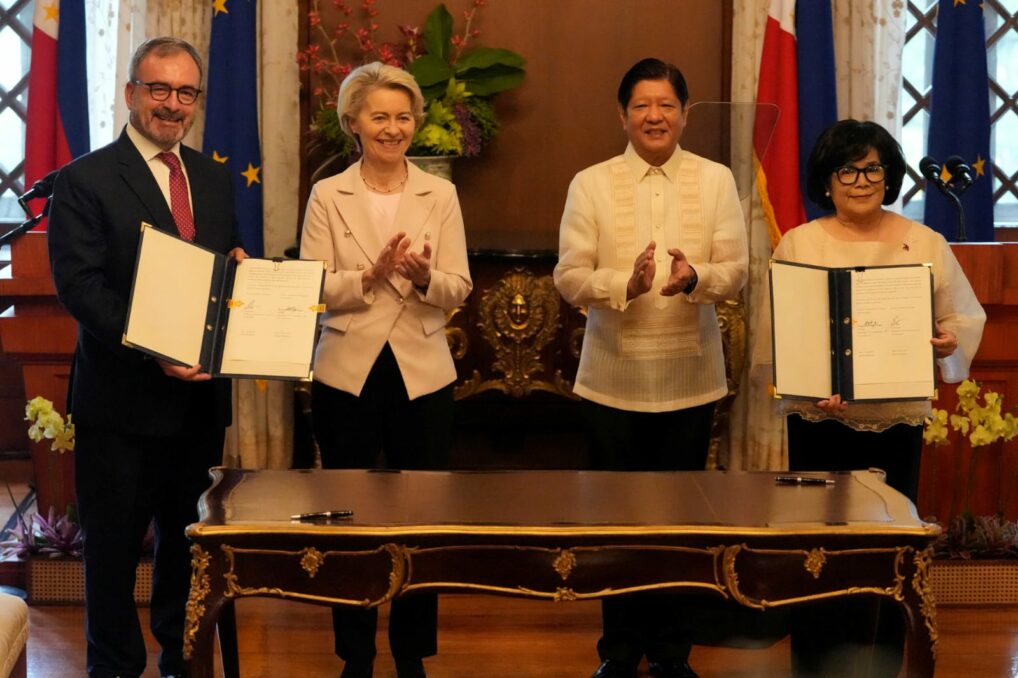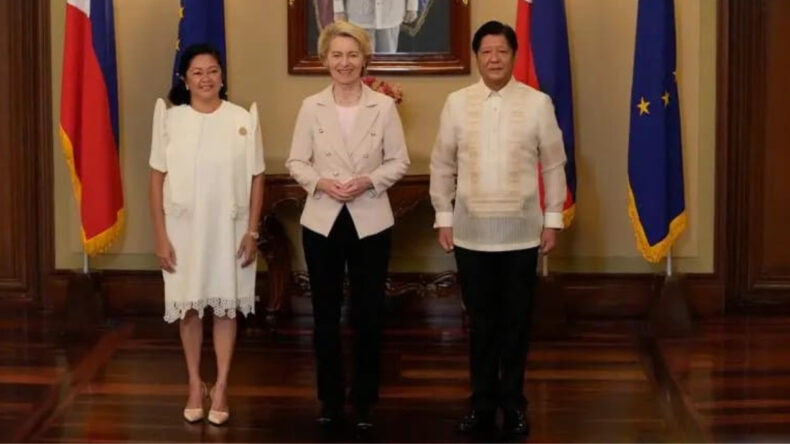EU Commission President Ursula von der Leyen made an official two day visit to the Philippines after 6 decades on the invitation of the President Ferdinand Marcos Jr.
Monday, July 31st, Ursula von der Leyen, the President of the European Commission, met with President of Philippines Ferdinand Marcos Jr. at the Malacanang Presidential Palace in Manila to begin her two-day official visit to the Philippines.
In 60 years of diplomatic relations, Von der Leyen became the first European commission President that made a visit to the Philippines in response to Marcos’ invitation in December 2022 during the EU-ASEAN Commemorative Summit in Brussels.
Ursula Von Der Leyen shared that the two leaders discussed a wide range of issues from trade to climate change. In a joint statement, she expressed that this visit would help to “accelerate a new era of cooperation” after a stormy period between two nations over Human rights.
She announced the relaunching of stalled trade negotiations, improved Maritime security, support in the fight against climate change and will provide new economic aids to the Philippines.

Von der Leyen shared that the Philippines is an important partner for the EU in the Indo-Pacific region as well established trade relations already exist between both nations. Also, EU is the Philippines’ fourth-largest trading partner.
She added that the EU is committed to strengthening their partnership and realising the full potential of the relationships between the two nations by exploring new opportunities while supporting the green transition and promoting a just economy.
Major Agreements between EU and The Philippines on Monday
Von der Leyen expressed her happiness with the decision to restart negotiations for a free-trade agreement, saying that it has the potential to create growth and jobs for both parties. She announced that their teams will begin working immediately to establish the necessary conditions to resume negotiations.
In addition, Von der Leyen reiterated on Monday that the EU supports the 2016 international arbitration ruling that invalidated China’s expansive claims in the South China Sea. She emphasised the importance of resolving disputes peacefully and highlighted the need for an Indo-Pacific free of coercion. Despite the hundreds of diplomatic protests filed by the Philippines, China does not recognize the landmark ruling.
Further, Von der Leyen expressed the EU’s commitment to supporting the Philippines in its efforts to combat climate change. She acknowledged Marcos’ priority in increasing the use of renewables in the country’s power mix to 35% by 2030.

Moreover, Von der Leyen emphasised that The EU will be providing €466 million ($514 million) in funding to support the Philippines’ transition to a circular economy and generate green energy through the Global Gateway sustainable investment plan. Furthermore, the EU will launch a “digital economy package” to enhance connectivity and make the Philippines more attractive to European businesses.
Most Importantly, Ursula von der Leyen expressed the EU’s readiness to strengthen cooperation with the Philippines on maritime security. She emphasised the importance of a free and open Indo-Pacific region. The EU wants to play a great role in ensuring security in the region and is ready to share information, conduct threat assessment, and build the capacity of the Philippine coast guard.
The EU has shown support to the Philippines to counter China’s claims of the entire South China Sea as its territory, building military installations and dispatching coast guard vessels to harass Philippine fishing boats.
The EU has repeatedly criticized the Philippines for their ignorance to Human rights and has demanded the Philippines to release the opposition leader Leila de Lima and hold accountability in the drug-related killings by the former President. However, Von der Leyen did not mention the progress of the EU’s human rights concerns during her visit to the Philippines.













